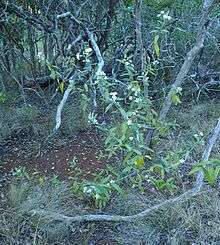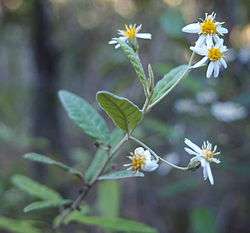Olearia canescens
| Olearia canescens | |
|---|---|
 | |
| Olearia canescens | |
| Scientific classification | |
| Kingdom: | Plantae |
| (unranked): | Angiosperms |
| (unranked): | Eudicots |
| (unranked): | Asterids |
| Order: | Asterales |
| Family: | Asteraceae |
| Tribe: | Astereae |
| Genus: | Olearia |
| Species: | O. canescens |
| Binomial name | |
| Olearia canescens (Benth.) Hutch. | |
Olearia canescens is a shrub belonging to the family Asteraceae.[1] Commonly known as Grey Olearia, Grey Daisy Bush or New England Daisy Bush, the species is endemic to Eastern Australia, growing in monsoon forests and drier rainforest types from North Queensland to northern New South Wales. O. canescens can grow as a woody shrub up to 6 metres in height, an unusual habit for a member of the daisy family. However it more commonly exists as a low shrub of 2 – 4 metres with only a slightly woody form.[1][2][3]
The leaves are narrow. The underside of the leaves, petioles and new growth are covered in fine white hairs. Plants produce typical daisy-type flower heads, with the central flowers being primarily yellow, surrounded by white ligules. On cursory inspection this appears to be a flower 10–20 mm across, with a yellow centre and white petals.
O. canescens is grown as a drought-resistant, frost-hardy garden plant.[3]

References
| Wikimedia Commons has media related to Olearia canescens. |
- 1 2 Hyland, B. P. M.; Whiffin, T.; Zich, F. A.; et al. (Dec 2010). "Factsheet – Olearia canescens". Australian Tropical Rainforest Plants. Edition 6.1, online version [RFK 6.1]. Cairns, Australia: Commonwealth Scientific and Industrial Research Organisation (CSIRO), through its Division of Plant Industry; the Centre for Australian National Biodiversity Research; the Australian Tropical Herbarium, James Cook University. Retrieved 12 May 2013.
- ↑ "Botanical: Olearia canescens. Common: Grey Olearia. Family: Asteraceae". Rainforest Publishing. Retrieved 12 May 2013.
- 1 2 "New England Daisy Bush Olearia canescens". Toowoomba Plants 2008 (blog). Retrieved 12 May 2013.